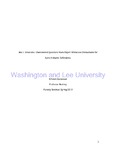Ake v. Oklahoma: Unanswered Questions Make Expert Witnesses Unreachable for Some Indigent Defendants

View/
Author
Gustavson, Kristen
Subject
Washington and Lee University, Shepherd Poverty Program
Evidence, Expert
Due process of law -- U.S. states
Virginia
Maryland
Metadata
Show full item recordDescription
Capstone; [FULL-TEXT FREELY AVAILABLE ONLINE] Kristen Gustavson is a member of the Class of 2011 of Washington and Lee University School of Law. The Fifth and Fourteenth Amendments entitle U.S. citizens to due process. Since it's adoption courts have argued over what due process means; some have expressed that the term is a flexible one, changing over time. Many issues about the meaning of due process have been decided, like the right to counsel, however, courts still analyze difficulties in assuring that all defendants are given a fair trial and due process. Problems arise when indigent defendants are unable to afford certain services essential to the trial process. Even with the advances in representation for indigent defendants, the criminal justice system introduces extra hardships for these defendants. Currently diminishing the ability of indigent defendants to get a fair trial is the refusal of courts to appoint expert witnesses. Wealthy defendants are free to hire whomever they wish, provided the expert's testimony abides by the evidence rules. Indigent defendants do not have the same ability. [From Introduction]